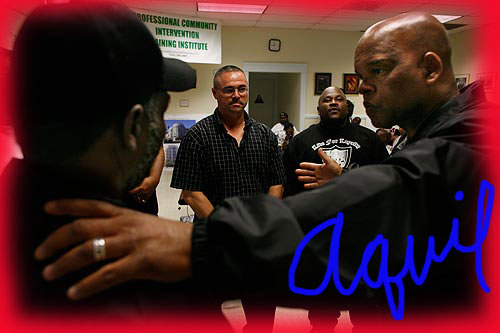
When all the gang intervention dollars were gathered under the single roof of the mayor’s office two years ago, there were several promises made by then Gang Czar Jeff Carr, to make sure the money was spent wisely.
One promise was to train and professionalize the so-called hard core interventionists who were were being given city funds.
(Another promise was to have full, transparent and competent evaluations of all the city’s gang prevention and intervention programs—and to have them from the programs’ inception. But that is a topic that must wait for another day.)
Reporter Scott Gold has addressed the training issue—or lack thereof—in Thursday’s LA Times. And he has done so very well.
He reports, among other findings, that the training that was supposed to have taken place a year ago, just ain’t happened. And he looks at the squabbling and the politics that have prevented its launch.
It’s an article worth reading.
But before you begin, here is a bit of info on the main players mentioned:
You know who Connie Rice is, of course. She’s a long time civil rights attorney and public policy expert who as the co-founder and co-director of LA’s Advancement Project has, in the last few years, has turned her attention to gangs.
Connie is also one of the smartest people in Los Angeles.
But Aquil Basheer is a remarkable man who brings to the table his own set of formidable talents.—plus thirty years of street experience as a community organizer, mentor, martial arts trainer and street intervention and threat analysis expert. (And in an interesting side note, Aquil’s father was LA’s first African American firefighter.)
Okay, now here’s the opening:
A city-sponsored training academy for gang intervention workers will open at least a year later than Los Angeles officials had hoped after a collision of philosophies and egos — a hitch in the city’s effort to modernize its campaign against street violence.
Officials said this week that an independent panel has selected the Advancement Project, the legal advocacy, civil rights and public policy group, as the winner of a bidding process to run the academy.
But that bid was never supposed to take place. The city’s original plan — to meld the best practices of two gang intervention programs into an “official” curriculum — collapsed, according to interviews with city officials and City Hall advisors.
Now, the academy isn’t expected to open until at least the spring of 2010 — a year later than originally envisioned. And it’s not over yet: The head of a group that lost the bid called the selection process flawed and pledged to appeal the decision into next year, when the City Council will be asked to sign off on the contract.
The dispute might seem like insider politics, considering that the contract is worth just $200,000 the first year, with a possibility of $800,000 over four years. But it means the continuation of the status quo: scores of interventionists fanned out across the city, some skilled and relied upon by law enforcement, but many unregulated, untrained and operating off the books amid dangerous crosscurrents of street politics.
The delay is seen as a particularly acute problem in South L.A., where marked declines in violence have created a rare window of possibility — one that could close if fragile understandings between rival neighborhoods begin to fray, officials said.
“South Los Angeles is in purgatory,” said Jorja Leap, a UCLA Department of Social Welfare adjunct professor, a gang specialist for 30 years and a key City Hall advisor. “There could be life-threatening consequences down the line.”
[LARGE SNIP]
Last year, then-City Controller Laura Chick delivered an indictment of the city’s scattershot gang outreach programs. Mayor Antonio Villaraigosa consolidated the programs; his Office of Gang Reduction and Youth Development, or GRYD, now oversees $20 million in annual intervention and prevention contracts.
The city also launched an effort to transform intervention into a professional field. Many interventionists are now subjected to financial audits and drug testing. The opening of the academy, where gang intervention workers would be trained and licensed, is seen as a critical step.
The city’s efforts are being watched closely; federal law enforcement and military officials — the latter wondering whether similar tactics might be used in Iraq and Afghanistan — have visited. “There is national interest in this,” said Connie Rice, the prominent civil rights attorney and a leader of the Advancement Project.
The city’s original plan was to combine the best practices of two intervention “schools,” one run by the Advancement Project, the other, the Professional Community Intervention Training Institute, by Aquil Basheer, a fixture in gang intervention for more than 30 years in South L.A.
From the start of discussions, it was evident there was a philosophical divide.
There’s more so read on.
(Photo by Michael Robinson Chavez / Los Angeles Times)
